Here she is LGBT virtue signalling under an umbrella on a rainbow crosswalk:
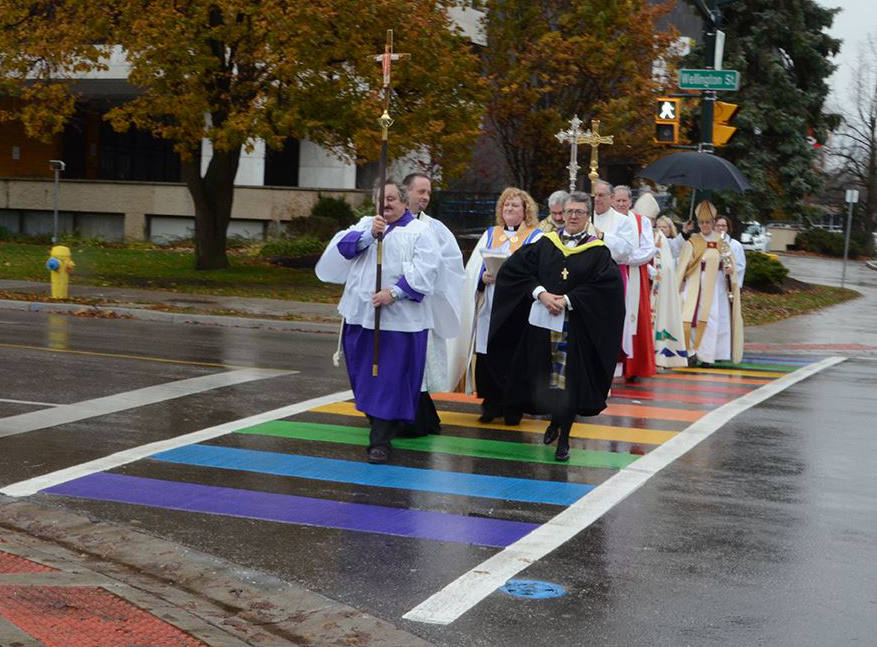
And readying her Proud Anglican flock for the London Pride parade (in a Tilley hat instead of a pointy one):
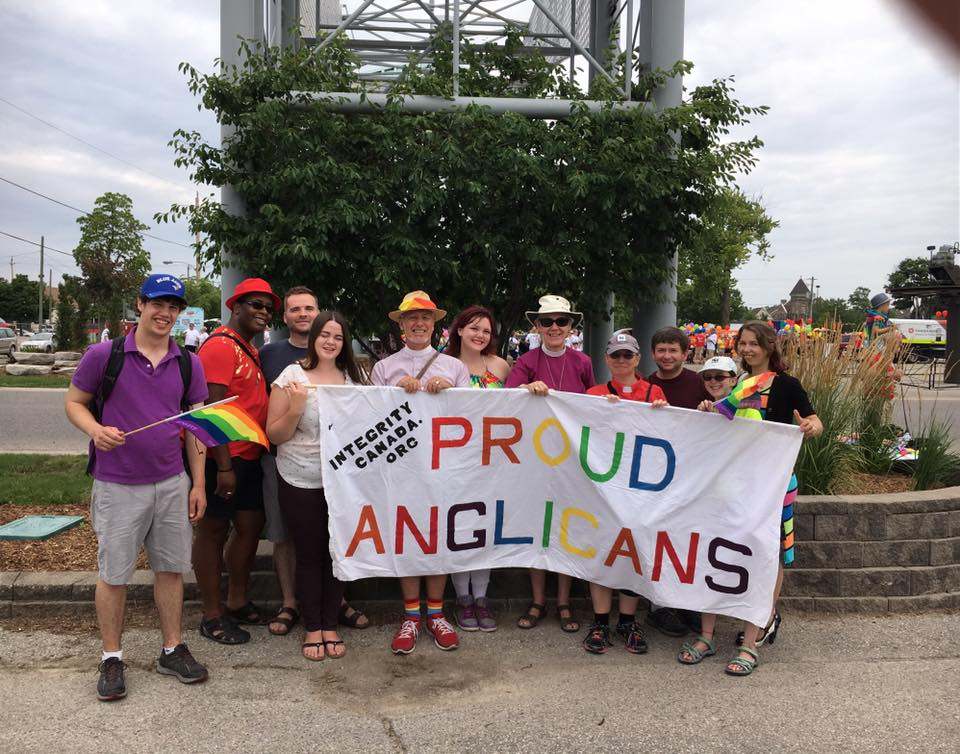

Here she is LGBT virtue signalling under an umbrella on a rainbow crosswalk:

And readying her Proud Anglican flock for the London Pride parade (in a Tilley hat instead of a pointy one):

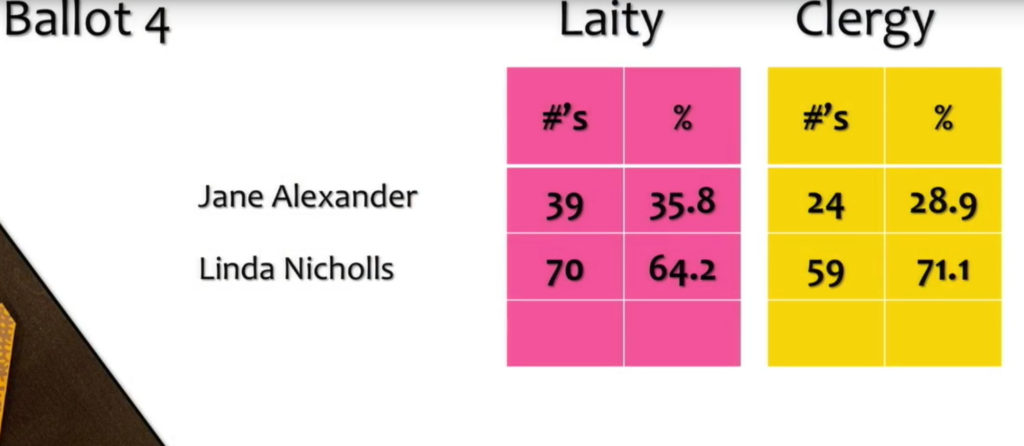
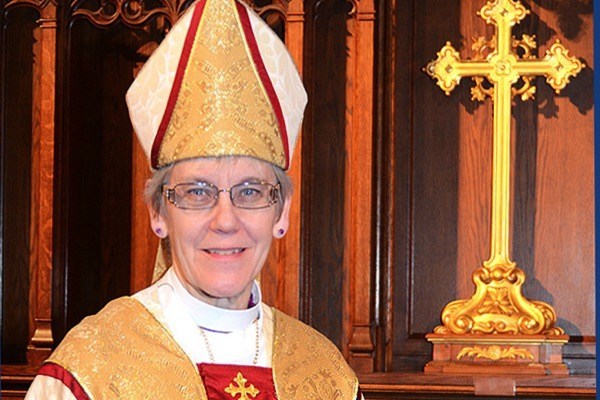
She is a liberal. I bet that surprises everyone.
Bishop Geoffrey Woodcroft has written to members of his diocese to say he intends to make use of the Local Option – also known as the Loophole Option – and proceed with same-sex marriages:
The Chancellor of the Anglican Church of Canada, Mr David Jones,has stated that the marriage canon does not preclude that marriage is between awoman and a man:The Anglican Church of Canada affirms, according to our Lord’s teaching as found in Holy Scripture and expressed in the Form of Solemnization of Matrimony in the Book of Common Prayer, that marriage is a lifelong union in faithful love, and that marriage vows are a commitment to this union, for better or for worse, tothe exclusion of all others on either side. This union is established by God’s grace when two duly qualified persons enter into a covenant of marriage in which they declare their intention of fulfilling its purposes and exchange vows to be faithful to oneanother until they are separated by death. The purposes of marriage are mutual fellowship, support, and comfort, and the procreation (if it may be) and nurture of children, and the creation of a relationship in which sexuality may serve personal fulfilment in a community of faithful love. This covenant is made in the sight of God and in the presence of witnesses and of an authorized minister.
At the 116th Session of the Synod of the Diocese of Rupert’s Land, held in October 2018,the group facilitating our discussions concerning the proposed change to the Marriage Canon reported that of all things discussed, our #1 priority was to nurture respectful relationships. Given that outcome, I am exercising my authority to continue the Rupert’s Land conversation that will leadto an Opt-Inpractice of Local Option in the matter of same-sex couples seeking marriage in the Anglican Church of Canada through the Diocese of Rupert’s Land, by January 1, 2020.
As tax evaders are drawn to tax loopholes, so Anglican bishops are attracted to canon law loopholes. Although the resolution to change the marriage canon failed to pass at synod, resolution A101-R1, adopting the document A Word to the Church, did pass.
The document has this statement:
Affirmation #2
Diverse Understandings of the Existing Canon
We affirm that, while there are different understandings of the existing Marriage Canon, those bishops and synods who have authorized liturgies for the celebration and blessing of a marriage between two people of the same sex understand that the existing Canon does not prohibit same-sex marriage.
In other words, bishops who are already marrying same-sex couples claim that they can do so because the existing canon does not prohibit them; so they can continue. And a motion affirming that idea has been passed.
This is what we’ve come to in the Anglican Church of Canada: do anything you like as long as you can’t find a rule that tells you not to.
Bishop Susan Bell has announced that, in spite of the fact that the synod motion to amend the Marriage Canon was defeated, she will continue to marry same-sex couples.
If bishops are free to do this, why bother with a vote? Why bother with a synod?
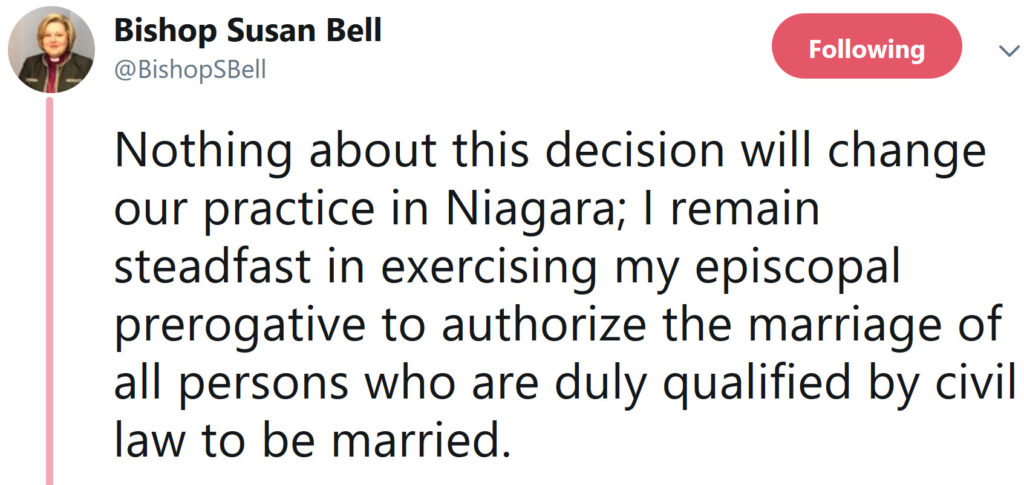
More here:
A Message from the Bishop of Niagara
The Right Reverend Susan BellMy heart aches with lament and my soul is filled with anguish knowing all the pain and hurt caused by the General Synod’s failure to ratify a change to the national marriage canon that would have explicitly expanded the meaning of marriage to include same-sex couples.
To the members of the LGBTQ2S community especially, I want to say that I stand with you and I share in your tears. I deeply value the person God beautifully created and called you to be and your contributions to the life of our Church. Your faithful witness has been long, difficult, prophetic, and sacrificial, and I give thanks to God for it.
While I am deeply disappointed, the General Synod did also overwhelmingly vote to affirm the prayerful integrity of the diverse understandings and teachings about marriage in the Anglican Church of Canada. This includes the inclusive understanding of marriage affirmed by the Report on the Marriage Commission, This Holy Estate, that we hold in Niagara.
As a result, nothing about this decision will change our practice in Niagara; I remain steadfast in exercising my episcopal prerogative to authorize the marriage of all persons who are duly qualified by civil law to be married, thereby responding to the pastoral needs present within our diocese. Two rites of The Episcopal Church, The Witnessing and Blessing of a Marriage and The Celebration and Blessing of a Marriage 2 continue to be authorized for use in our diocese, in accordance with our established episcopal guidelines.
There will be more to say in the coming days but for now I ask your prayers and solidarity for and with the LGBTQ2S community, globally and locally, in the wake of this decision and in the face of persistent discrimination, oppression, and violence. Pray also for the members of General Synod that in the days to come the Holy Spirit will help us discern a way forward that upholds the dignity of every human being and boldly proclaims God’s Way of radically inclusive love.
Bishop Skelton did not attend the synod because of illness. She had this to say about the failure of the motion to change the Marriage Canon:
I was very disappointed not to have been with our delegates on account of my illness as the vote on the marriage canon occurred tonight. All that I can say is that I’m very sorry for all the feelings of hurt that this vote has caused, and that I urge everyone to pray for the Anglican Church of Canada.
Remember that this Synod is not over! And so please pray that together we can find a better solution to the marriage question.
+Melissa
There was a lot of emotion following the vote. Someone screamed. Another person ran out in tears. The final prayer was delivered by a lady who had tears trickling down her face. Fred Hiltz said he was “concious of pain in this place”. Anyone would think the the desire to change the canon was propelled by emotion rather than Scripture and reason.
Like a zombie that just won’t die, the possibility of a new motion to revisit the Marriage Canon resolution was raised from the floor at the end of the evening.
 The two thirds majority needed to allow same-sex marriage was met by the laity and clergy but defeated by the bishops.
The two thirds majority needed to allow same-sex marriage was met by the laity and clergy but defeated by the bishops.
Primate Fred Hiltz appeared to be stunned by the vote.
Before the meeting was adjourned, there was talk of making another motion to somehow bypass the decision of this defeated motion, so this may not be over.
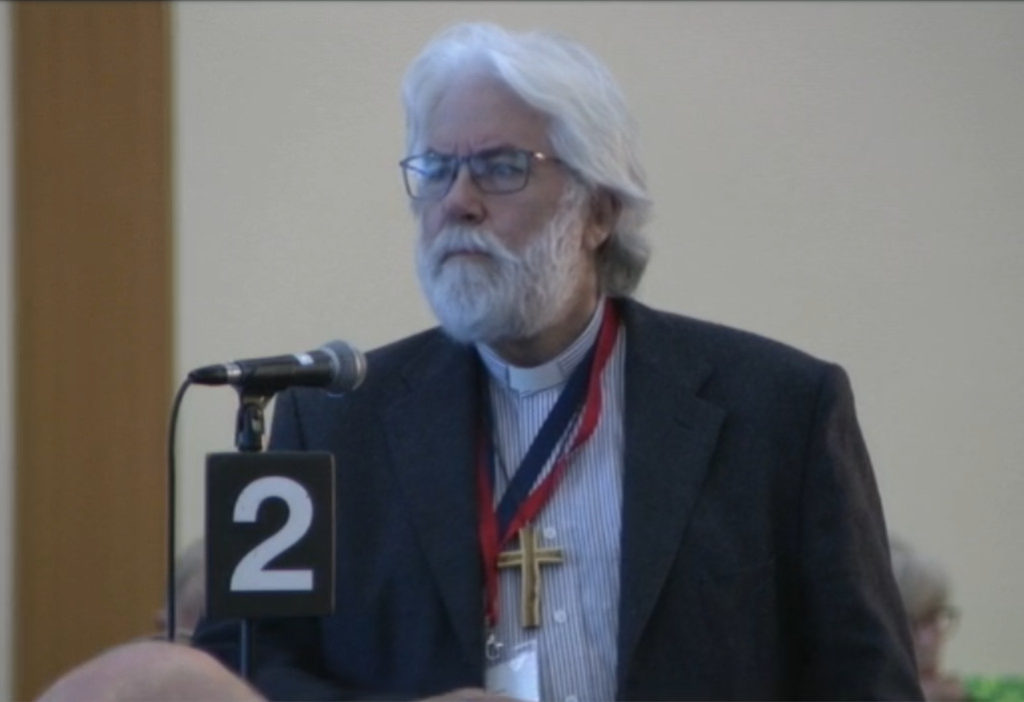 I’m watching the live stream of GS2019. The discussion is about the change to the Marriage Canon. A motion has just been made to close debate. That means that Bishop David Parsons will not be able to express his views; apparently something similar happened in 2016. I wish I had recorded it, but the gist of it was that, in spite of all the talk about respect for all points of view, not much respect was being shown to the bishop – who, of course, disagrees with the motion.
I’m watching the live stream of GS2019. The discussion is about the change to the Marriage Canon. A motion has just been made to close debate. That means that Bishop David Parsons will not be able to express his views; apparently something similar happened in 2016. I wish I had recorded it, but the gist of it was that, in spite of all the talk about respect for all points of view, not much respect was being shown to the bishop – who, of course, disagrees with the motion.
It went further – almost to the point of unCanadian unpleasantness – as the bishop seemed to throw down a gauntlet: there would be serious consequences if he wasn’t heard. If anyone has a better recollection of exactly what was said, please comment below.
Bishop David: I’m sure ANiC would be delighted if you spoke at any of its synods.
From here:
In an exercise intended to produce more compassionate discussions than those that sometimes prevailed during marriage canon discussion in 2016, members of the 2019 General Synod spent almost the entire afternoon of the gathering’s first official day of business hearing about and practicing ways of speaking and listening respectfully to one another.
An organisation that spends an entire afternoon discussing how to discuss things doesn’t stand much of a chance of getting to the heart of the matter to be discussed. It is like Kierkegaard’s view of ‘reflection’ as opposed to ‘immediacy’, where you have an idea about something and indulge in endless conversations about the idea, instead of dealing with the thing itself. Will anyone be allowed to express any strong reasons to oppose same-sex marriage or will they be squashed as hurtful or bullying. We’ll see.
From 1:30 p.m. until close to 5 p.m. on July 11, with one break, Lynne McNaughton, bishop of the diocese of Kootenay, and priest and psychologist Canon Martin Brokenleg led a session on “being a synod,” discussing the importance of living out Christian love during debates about potentially contentious issues, and having synod members practice respectful listening and talking skills in table groups.
The Anglican version of “Christian love” has devolved into mushy sentiment centred around not hurting anyone’s feelings.
Dean Peter Wall, chair of the General Synod planning committee, said the idea for the exercise arose out of a great deal of talking and praying committee members had done, in the hope of creating a “listening, learning atmosphere” at the 2019 synod, and to help it be “both a community and a body.”
The alleged “listening, learning atmosphere” is a hoax: no one was willing to listen to ex-homosexuals and ex-lesbians from the Zacchaeus Fellowship in prior synods and no one will be in this synod.
Brokenleg was to have co-led the session with Archbishop Melissa Skelton, metropolitan of the ecclesiastical province of British Columbia and Yukon and diocesan bishop of New Westminster, but Skelton was ill and unable to attend General Synod on Thursday. McNaughton, another member of the General Synod planning committee who, Wall said, was closely involved in developing the exercise, took her place Thursday.
McNaughton said she hoped the exercise would allow members of synod to be their “authentic selves” in their discussions while at the same time making room “for others with different authentic selves and perspectives.”
What on earth are “authentic selves”? How did non-authentic selves get nominated as delegates? Have synod delegates been the victim of alien body snatchers and become Pod People, duplicates in every respect except in their ability to maintain a connection with authenticity? It would explain the behaviour of many of the clergy.
Listening and speaking well through difficult discussions, she said, is a way to “be as Christ to one another, to love one another as Christ has loved us,” and by doing this, Christians can be an example to the world.
“We are called to be a witness to a world that is hungry for civility, parched for compassion,” she said. “The world is watching how we treat each other in the midst of difference, and the world is waiting to be inspired.”
The world is hungry for truth not sickly, bogus, anodyne civility.